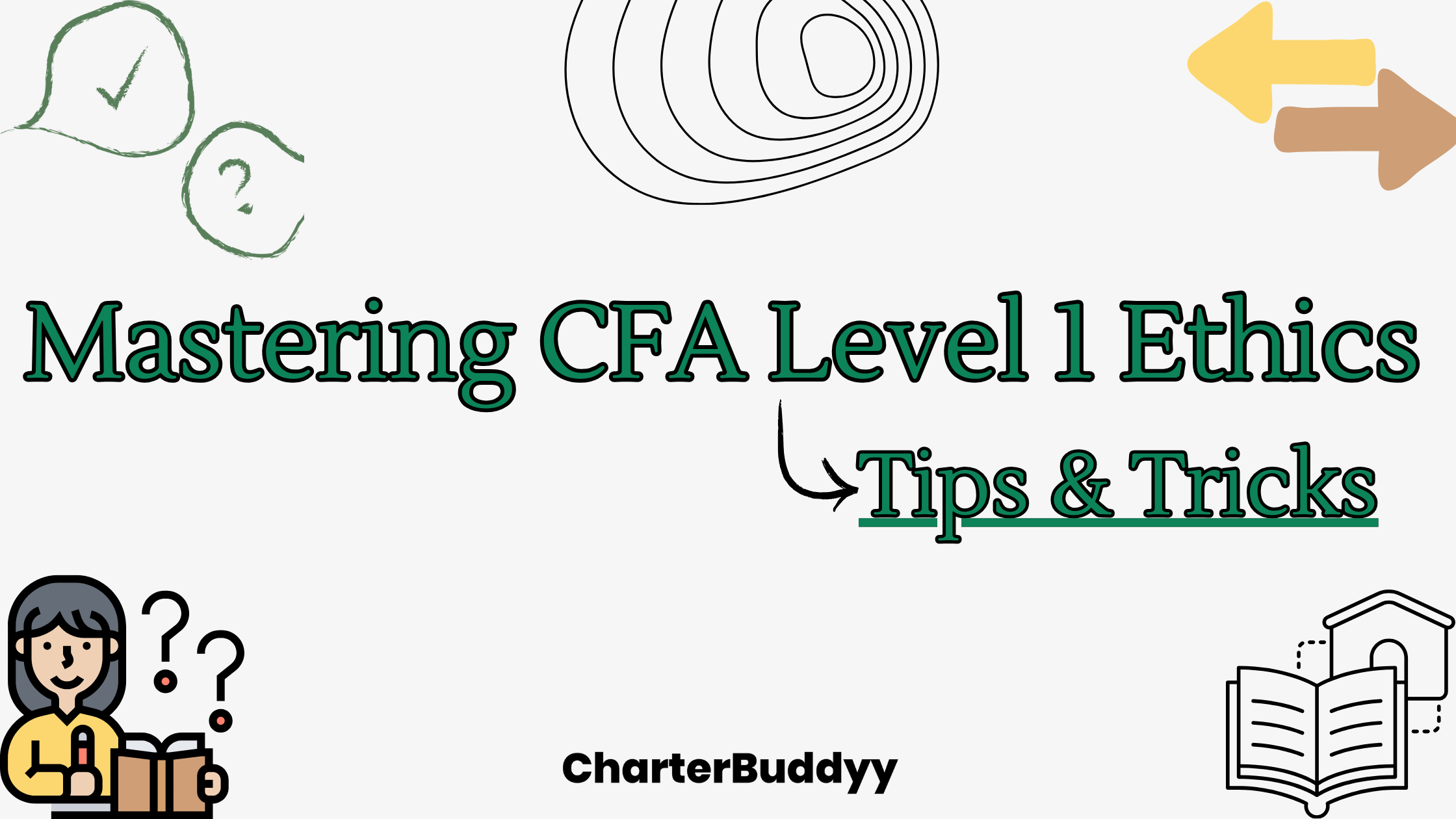
Ethics is one of the most crucial and high-weightage topics in the CFA Level 1 exam. The entire subject is heavily based on theory and emphasizes focusing on the application of various codes and standards.
However, many candidates struggle with ethics due to its vast theory, which can get boring, and its tricky questions that confuse many initially.
Some even make the mistake of skipping it until the last minute—a decision that often leads to poor performance.
To help you truly understand the CFA Code Of Ethics and Standards, here’s a structured approach that will ensure you excel in this section:
Why CFA Level 1 Ethics is Important
- High Weightage – Ethics comprises 15-20% of the CFA Level 1 exam. Candidates can expect around 27-36 questions in the exam. [ This is not an exact range, just an estimate based on CFA Institute’s curriculum.]
- Tiebreaker Effect – If your score is near the passing threshold, a strong Ethics score can determine whether you pass or fail.
- Application-based – Ethics is not about memorization; it tests how well you apply the concepts in real-world scenarios.
Keeping its importance in mind, here are some tips to help you master ethics and score well in the exams!
10 Essential Tips to Master CFA Level 1 Ethics
-
Read the CFA Institute’s Ethics Handbook Multiple Times
-
Focus on the 7 Standards of Professional Conduct
- Professionalism
- Integrity of Capital Markets
- Duties to Clients
- Duties to Employers
- Investment Analysis, Recommendations and Actions
- Conflicts of Interest
- Responsibilities as a CFA Institute Member, or CFA Candidate
-
Understand Ethics, Don’t Memorize It
-
Solve at Least 200+ Ethics Questions
-
Understand The Ethical Situation
- most appropriately
- most likely
- Most accurate
- least likely
-
Study the Justifications for Correct and Incorrect Answers
-
Use the 'Least Bad' Strategy for Tough Questions
-
Prioritize Ethics in CFA Mock Exams
-
Don’t Forget GIPS!
-
Revise Ethics & GIPS Before Exam Day
The CFA Institute’s Ethics Handbook is your ultimate guide to understanding this topic. Read it at least twice to internalize key concepts. Get to know the Code of Ethics, 7 standards of professional conduct, application of standards
The standards of professional conduct are an important guide for investment professionals. These form the core of Ethics along with the code of ethics. The 7 standards are as follows.
Master these standards and learn how they apply in practical scenarios, as this is where most exam questions originate.
Ethics questions are designed to test application, not rote memorization. Focus on understanding the logic behind the rules so you can apply them correctly. The “Guidance for Standards I-VII” chapter focuses on case studies and applications.
Ethics questions often have tricky wording. Practicing 200+ questions will help you recognize the type of questions easily and avoid confusion.
Ethics questions often give you a case study or an example in which you will have to understand the ethical situation, based on which you will be asked questions. These can be to ascertain whether the situation violated any standards, and if yes, which one. Focus on these keywords:
These provide strong hints to the correct answer. Read questions carefully and look for these cues.
You might not understand the questions and their meaning initially. Understanding why an answer is incorrect is just as important as knowing why another is correct. This will improve your ability to eliminate wrong choices in tough questions.
When stuck between two similar choices, pick the option that aligns most closely with the CFA Ethics Code and Standards. Often, it’s about choosing the least unethical action rather than the correct one.
Track your Ethics performance in mocks. If your score fluctuates significantly, dedicate more time to practicing Ethics questions. Remember, ethics has a high weightage and you can expect 27-36 questions.
The GIPS standard is introduced after the code of ethics and standards of conduct. While it is a small topic compared to the rest of the Ethics curriculum, it is no less important. You should ideally study GIPS from the CFA readings and not from other sources. 3rd party resources often summarize this topic in brief, which might omit certain points.
A few days before the exam, revisit the 6 Code of Ethics, 7 Standards of Professional Conduct and its applications, GIPS, and past solved questions. Reviewing your mistakes and going through past questions will help reinforce key concepts.
While these tips help candidates in their Ethics preparation, we recommend implementing these pointers wherever possible and following important tips like practicing questions, revising, and understanding the situation of the question.
Conclusion: How To Prepare Ethics
A strong Ethics score can significantly boost your CFA Level 1 results. Don’t make the mistake of leaving it for the last minute and ignoring its importance.
Instead, integrate CFA Ethics into your study plan early, practice consistently, and develop an understanding of what ethics questions mean.
By following these strategies, you can confidently tackle the CFA Ethics Exam and improve your chances of success. Good luck!
Table of Contents
- Why CFA Level 1 Ethics is Important
- 10 Essential Tips to Master CFA Level 1 Ethics
- Conclusion: How To Prepare Ethics

